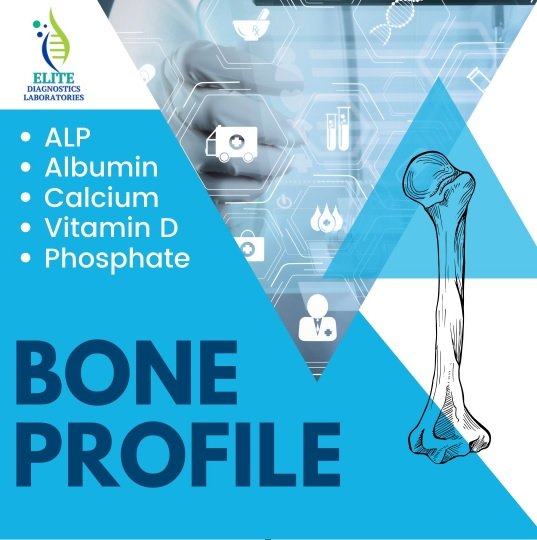Showing all 3 results
Bone Profile
A bone profile (often termed as bone panel or bone markers test) assesses the health and functionality of the bones. This profile measures several substances in the blood, many of which are either released by bone cells or influence bone health.
Components of a Bone Profile:
- Calcium: A mineral essential for bones, nerves, muscles, and blood clotting. Blood calcium levels are tightly regulated, and abnormalities can indicate a variety of conditions.
- Phosphate (or Phosphorus): Another mineral vital for bones. Like calcium, its level is tightly regulated in the blood.
- Alkaline Phosphatase (ALP): An enzyme produced in the liver and bones. A specific isoenzyme of ALP, the bone alkaline phosphatase, can increase when there’s active bone formation.
- Vitamin D (specifically 25-hydroxyvitamin D): Essential for calcium absorption from the gut. It helps maintain calcium and phosphate levels to support bone health.
Indications for a Bone Profile:
- Suspected Metabolic Bone Diseases: Like osteoporosis or osteomalacia.
- Monitoring of Conditions: That may affect bone metabolism, such as primary hyperparathyroidism or certain types of malignancies.
- Kidney Disease: Patients with chronic kidney disease often have disturbances in bone metabolism.
- Malabsorption Syndromes: Conditions like celiac disease or Crohn’s disease might interfere with the absorption of calcium or vitamin D.
- Evaluating Elevated or Decreased Calcium Levels: To determine the cause of hypercalcemia (elevated calcium) or hypocalcemia (decreased calcium).
- Medication Monitoring: For patients on certain medications that affect bone metabolism, like bisphosphonates or some antiepileptic drugs.
- Postmenopausal Women: Especially those at risk for osteoporosis, to assess bone health.
- Fracture Risk Assessment: In individuals with risk factors for bone fractures.
- Monitoring Treatment: Evaluating the effectiveness of treatment for osteoporosis or other bone diseases.
As with any blood test, the results should be interpreted in the context of the individual’s clinical picture. If abnormalities are detected, further investigations, like bone density scans or X-rays, may be needed. A healthcare professional can provide guidance on the implications and next steps based on test results.
CMP Complete Metabolic Profile
Comprehensive Metabolic Panel, is a group of blood tests that provides important information about your body’s chemical balance and metabolism. It helps doctors evaluate organ function, […]
Hepatic Panel
The hepatic panel, often referred to as a “liver function test” or “LFT,” is a group of tests that provide information about the state of a […]




